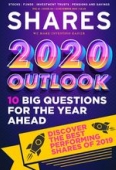Archived article
Please note that tax, investment, pension and ISA rules can change and the information and any views contained in this article may now be inaccurate.
Equitile Resilience: the quality-focused fund you’ve never heard of

In today’s rapidly-evolving business world, companies are living faster and dying younger. For private investors, that means picking tomorrow’s big winners or long-term survivors is becoming increasingly tough.
Just buying and holding the most profitable companies today is becoming a much less viable strategy for the long-term investor. However by adapting portfolios, you can ensure you aren’t left behind.
Such thinking is at the heart of the Equitile Resilience Fund, a master fund which retail investors can access through the Equitile Resilience Feeder Fund (BDD1KW2). The latter invests 100% in the master fund and has a 0.89% ongoing charge.
Managed by Equitile Investments’ co-founder and chief investment officer (CIO) George Cooper, Equitile Resilience has delivered three year annualised returns of 14.52%, according to fund research firm Morningstar.
The portfolio aims to deliver capital growth by investing in large, growing companies in developed markets. Cooper is focused on resilient, conservatively financed, well-managed companies with a proven track record of innovation and growth.
A concentrated portfolio of 37 holdings, its characteristics reveal a fund with a large cap bias – the average market cap is $190.4bn – a low net debt-to-operating cash flow ratio of 0.44 and impressive five year earnings per share growth of 31%.
DARWINIAN APPROACH
The Equitile approach is designed to find the world’s highest-quality com-panies. The thesis is that because no company leads forever, the fund must have an adaptive process. Stock selection mistakes are dealt with swiftly in order to keep the fund resilient.
Companies passing muster with Cooper, who has an optimistic world view given the innovation currently underway, must be able to achieve exceptional rates of profitable growth without using excessive leverage.
Such companies are typically leaders within their respective fields and operate in industries that are expected to grow more rapidly than the wider economy and for an extended period too.
Due to the rapid pace of innovation no company can be considered safe from changing competitive pressures. Hence the actively-managed portfolio adapts to ensure it remains at the vanguard of economic progress and resilient to an ever-changing economic environment.
And in contrast to the likes of the legendary investor Warren Buffett, Cooper and the Equitile team don’t believe in the ‘buy and hold’ mantra. While they like to minimise dealing costs, they see no merit in sitting on the same portfolio for years and years.
‘We have a brutal, survival of the fittest attitude,’ explains the cerebral Cooper, the author of The Origin of Financial Crises, Money, Blood and Revolution and Fixing Economics. ‘If they aren’t performing, we take them out.’
AVOIDING EXCESSIVE DEBT
Crucially, Equitile Resilience only puts money to work in companies with impressive track records of cash-generative growth and avoids companies that rely on excessive debt.
By eschewing companies that have grown by over-stretching their balance sheets, the fund avoids the worst aspects of financial distress while also ensuring that the corporate names in the portfolio are growing because they have a genuinely good business franchise.
‘We look for companies with very sound balance sheets,’ continues Cooper. ‘And we are quite debt obsessive as a firm.’ Indeed, Equitile Investments’ chief executive Andrew McNally is the author of a book entitled Debtonator: How Debt Favours The Few and Equity Can Work For All of Us.
‘We look for companies with very sound finances and we look at interest service costs relative to their free cash flow,’ adds Cooper, who also screens for firms with a ‘high quality corporate culture’.
PORTFOLIO NAMES
Investors are buying into names including tech titan Microsoft, US chipmaker Nvidia and consulting and outsourcing services provider Accenture. The strongest portfolio performers in November were iPhone maker Apple, software developer Adobe and Australian pharmaceutical behemoth CSL, all of which gained 10% in the month.
‘We are also heavily invested in luxury goods,’ enthuses Cooper, pointing out that LVMH, the luxury conglomerate buying US jeweller Tiffany & Co, is strategically positioned to sell into China.
‘We also own Estee Lauder and we are in medical technology including surgical robots maker Intuitive Surgical.’
Important information:
These articles are provided by Shares magazine which is published by AJ Bell Media, a part of AJ Bell. Shares is not written by AJ Bell.
Shares is provided for your general information and use and is not a personal recommendation to invest. It is not intended to be relied upon by you in making or not making any investment decisions. The investments referred to in these articles will not be suitable for all investors. If in doubt please seek appropriate independent financial advice.
Investors acting on the information in these articles do so at their own risk and AJ Bell Media and its staff do not accept liability for losses suffered by investors as a result of their investment decisions.

 magazine
magazine











